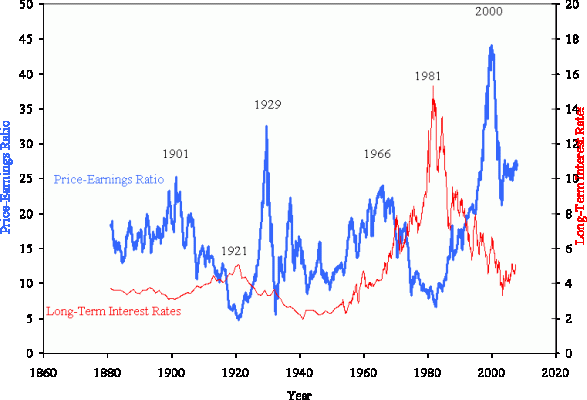I don't remember ANYONE saying this in Jan 2000. The S&P500 stats were way out of line....
Audrey
Maybe these will function as a wee reminder?
Amazon.com: Dow 36,000: The New Strategy for Profiting From the Coming Rise in the Stock Market: Books: James K. Glassman,Kevin Hassett,Kevin A. Hassett
(Copyright © 1999, 2000 by
James K.
Glassman and Kevin A. Hassett)
OR
In the fall of 1999, journalist James K. Glassman and economist Kevin A. Hassett published a book provocatively titled
Dow 36,000: The New Strategy for Profiting From the Coming Rise in the Stock Market. The New Economy was not a high-tech version of tulipmania, they argued, and the stock market was not overvalued. Properly understood, wrote Glassman and Hassett, the Dow--then upwards of 10,000--was actually undervalued:"Stock prices could double, triple, or even quadruple tomorrow and still not be too high." It was a bold thesis, and more than a few skeptics disputed it in op-eds and book reviews. But this was the height of the boom, the authors were telling Wall Street exactly what it wanted to hear, and
Dow 36,000 was a sensation. It rapidly became a
New York Times bestseller, sparking incessant water-cooler conversation and wide coverage on the nation's business pages. Glassman, having already been a chat-show host and nationally syndicated financial columnist for
The Washington Post, became a bona fide celebrity, widely profiled in the press and invited on television shows across the country to predict that the party, far from being over, was just getting started.
So optimistic was Glassman, in fact, that a few months after the book appeared, he launched a dot.com, Tech Central Station, based on just the kind of vague-but-intriguing business plan that attracted so much venture funding at the height of the tech boom. good cover."
OR
Henry Blodget (born
1966) is a former
securities analyst who was senior Internet analyst for
Merrill Lynch during the
dot-com bubble.
Blodget received a
Bachelor of Arts degree from
Yale University and began his career as a
freelance journalist and was a proofreader for
Harper's Magazine. In 1994, Blodget joined the corporate finance training program at Prudential Securities, and, two years later, moved to Oppenheimer & Co. in equity research. In December
1998, he predicted that
Amazon.com's stock price would hit $400 (which it did a month later, gaining 128%). This call received significant media attention, and, two months later, he accepted a prized position at Merrill Lynch.
[1][2] Blodget's influence continued to increase, and, in 2000, he was voted the No. 1 Internet/eCommerce analyst on Wall Street by Institutional Investor, Greenwich Associates, and thestreet.com.
In early 2000, days before the dot-com bubble burst, Blodget personally invested $700,000 in tech stocks, only to lose most of it in the years that followed.[3] In 2001, he accepted a buyout offer from Merrill Lynch and left the firm.
OR
Dear Abby (Joseph Cohen)
By
Barbara Eisner Bayer (TMF Venus)
March 30, 2000 Down, down, down the market goes. Where it stops, nobody knows. And who's to blame?
This week we can point our little fingers at Abby Joseph Cohen, the managing director and chair of the Investment Policy Committee of
Goldman Sachs (NYSE: GS). On Tuesday, she announced a reduction in the stock allocation in Goldman Sachs' model portfolio from 70% to 65%.
"For the first time in a decade," the media-appointed leader of the bulls declared, "our model portfolio is no longer recommending an overweighted position in technology." Uh oh.
Or from Bloomberg,
Bloomberg.com: Worldwide
[Abby] stayed bullish on computer-related stocks for too long as the S&P 500 suffered a bear market from March 2000 to October 2002. Cohen said in October 2000 that technology shares would be a good investment in 2001. The S&P 500 Information Technology Index tumbled 26 percent that year.
OR
Goldman Strategist Remains Bullish, Though Less So, for 2000 - New York Times
Published: December 31, 1999
Abby Joseph Cohen, one of Wall Street's most influential strategists, said yesterday that the stock market's stunning 1999 ascent had turned her into a regular bull.
''I used to be a superbull. Now I'm just a bull,'' the chief United States market strategist for Goldman Sachs said in an interview on the floor of the New York Stock Exchange.
For 2000, Ms. Cohen is forecasting single-digit percentage gains for blue-chip stocks, in contrast to the double-digit percentile advances the Dow Jones industrial average registered in each of the last five years, including 1999.
If you need more, do not hesitate to ask. Glassman as syndicated business wrier for the Washington Post, Blodgett as Chief Investment Strategist for Merrill Lynch, and Abby Joseph Cohen bearingthe same august title at Goldman Sachs are merely the most prominent and most widely quoted and followed of the year 2000 bulls, not by any means the only ones.

Ha

